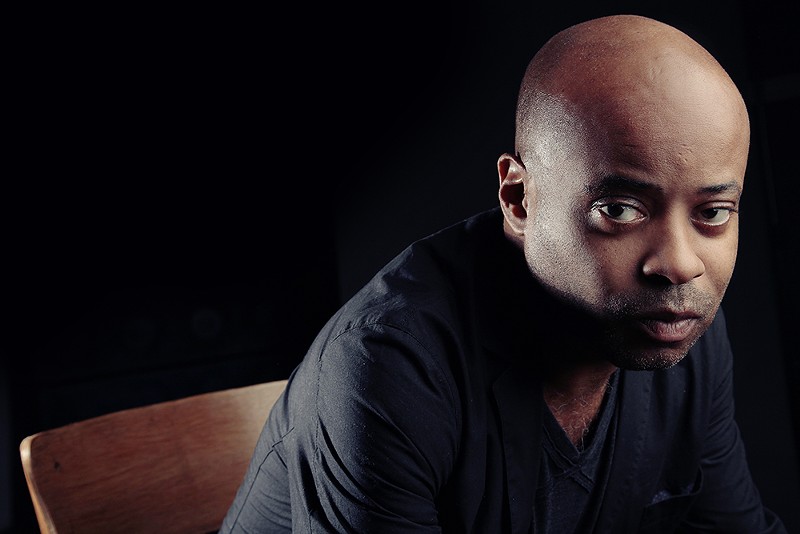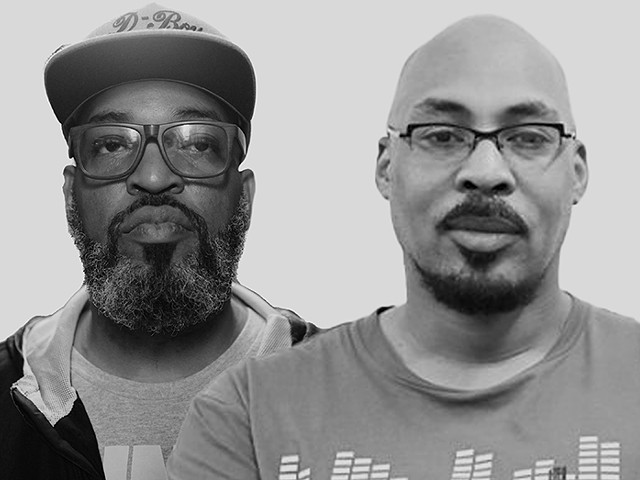The year was 1979, and Juan Atkins knew he was onto something special.
Credited as one of the founders of Detroit techno, the genre pioneer was making music on a synthesizer bought for him by his grandmother. “I was going to high school and there were no other musicians around me,” he recalls. “So I had to make my own band.”
On a mini monophonic synthesizer, which had just been released for public consumption, Atkins, now 59, learned how to connect drum sounds. He tinkered with white noise and pink noise until he developed a fully-formed song. It was the beginning of what would soon become known as Detroit techno, a sound that swept the world and grew its own subculture in the ’80s and ’90s, later influencing mainstream dance music.
Now, Atkins is set to headline the Stargate Stage at Movement Electronic Music Festival on Sunday, May 29, where he’ll perform a special set to commemorate 40 years of Detroit techno, starting at 10:30 p.m. Throughout his set, Atkins will traverse the history of Detroit techno, starting with his very first year of college when his hard work making music began to pay off.
“I was taking mostly music theory and music courses,” he recalls of his time at Washtenaw County Community College, which he attended after graduating from Belleville High School. In a class of 12 students, Atkins played his creations to his peers, and his classmates couldn’t get enough of the futuristic sound they were hearing.
Yet Atkins had no idea how big the sound would actually become. “I never saw it coming,” he says of Detroit techno’s growth. “But I knew I wanted to put out records.”
In an experiment that he says turned out “10 times bigger” than he thought it would, Atkins launched a collaboration with a fellow local musician named Richard Davis. Presenting Davis with his demo, the two combined their skills — Davis, who had already released a record with soundscapes, married his musical style with Atkins’ rhythms.
The outcome was Cybotron, an electro music group that would put Detroit techno on the map. In 1981, the group’s first record was released. On the A side was “Alleys Of Your Mind,” while the B side contained “Cosmic Raindance.” The Electrifying Mojo, a Detroit radio personality and DJ who broke dozens of artists to the Detroit community and beyond, got his hands on a copy of the record and played it late at night to Detroiters tuning in.
Then the calls wouldn’t stop. “It went viral,” Atkins recalls. “It just blew up in Detroit.”
Over the next several years, Cybotron was picked up by New York radio stations. Eventually, the music made its way to the United Kingdom, but it wasn’t until fellow Detroit techno pioneers and friends Kevin Saunderson, Derrick May, and Eddie Fowlkes began to also release music that the sound solidified itself as a true movement.
“1987 and 1988 were the most important years,” Atkins says. Atkins, May, Saunderson, and Fowlkes were simultaneously releasing hits, landing everyone a deal with Virgin Records. The compilation was dubbed Techno! The New Dance Sound of Detroit.
Worldwide tours began immediately. “It was like a culture shock,” Atkins recalls of bringing Detroit techno overseas. He played one of his very first shows in London to a crowd of 5,000, where he was the only Black person in addition to a maintenance man. “That was something that I’d said I’d never see in the U.S.A. The U.K. was more progressive and open-minded towards music, specifically music made by Black kids.”
Ironically, Detroit techno initially took a stronger footing overseas than in Detroit. In Detroit, Atkins says it took the music about 10-15 years to branch out of the underground community, where it had found a home in the city’s rave culture. With the launch of Detroit Electronic Music Festival, or DEMF, in 2000 (later to become Movement Music Festival), Atkins finally had a platform to play the same type of set he would play in Europe for a U.S. audience, now in a more public setting.
“It was one of the things that was really notable in the progression of Detroit techno,” he says of the early 2000s. “Then the internet happened. It broke down racial barriers and it allowed people to interact with each other, to find out where music is coming from.”
Now, anybody could discover Detroit techno. On the flipside, more people also had the ability to make their own music. “The music had a metamorphosis,” Atkins says of the genre. “It was progressing, but at the same time, we found ourselves discerning what was good electronic music and what was bad. By 2010, it wasn’t a novelty anymore.”
As the 2010s rolled in, Atkins says access to music-making technology saturated the market — a blessing and a curse at the same time. “You’ve got 10 times more people making music and it allows more creativity,” he recalls. “But then it becomes very hard work because you have all of this stuff to sift through and 75% of it is bullshit.”
Despite the challenges, Detroit techno continued to grow, perpetuated by its founders and also influenced by newer generations of artists joining its ranks. The biggest hurdle, Atkins says, was an unexpected one that shut down the whole world: COVID-19.
Clubs were closed, artists ceased to tour and music fans were stuck at home. For Atkins, however, it was a surprising opportunity to slow down and get back to the basics. “You can’t go anywhere, you can’t go to restaurants,” he says, having grown accustomed to four decades of traveling on weekends to gigs. “It allows you to think.”
The pandemic gave Atkins a chance to spend two years in the studio, a scenario that had become nearly unheard of due to the growing demands of his busy schedule. “I didn’t really have time to develop sound designs,” he says of pre-pandemic years.
Now, Atkins plans to present his new material to the world during his headlining set at Movement, and says has no plans of slowing down. Instead, he continues to look to a world that isn’t here just yet, the same way he did more than four decades ago.
“It’s 40 years of Detroit techno,” Atkins laughs. “40 includes the future.”
Stay connected with Detroit Metro Times. Subscribe to our newsletters, and follow us on Google News, Apple News, Twitter, Facebook, Instagram, Reddit, or TikTok.







